Dev+GNU Pascal: A full GPC programming environment + Win32 IDE.
If you search the Web for programming software for old Windows operating systems, you not only find lots of development applications of the past, mostly having become abandonware and thus being free of charge to be used, but you will also be surprised how much efforts are made to keep these old OS alive, programmers from all over the world creating complete development environments for older and newer programming languages intended for long ago Windows releases.
Dev+GNU Pascal is a full GNU Pascal (GPC) Programming Environment + Win32 IDE, what means that it includes everything that you need to develop Command Prompt and GUI applications on old 32-bit Windows operating systems, using the Pascal programming language. This tutorial describes, how I installed and run it on a Windows 2000 Pro VMware virtual machine. The software should also run without problems on Windows 98 and Windows XP.
You can download the IDE plus GPC (free of charge, of course) from the gnu-pascal.de website (contributions of Prof. A. Olowofoyeku; The African Chief). The download is an installer, that you can transfer to your Windows 2000 machine using, for example, a USB 2.0 stick. The screenshot below shows the Welcome window of the setup program.
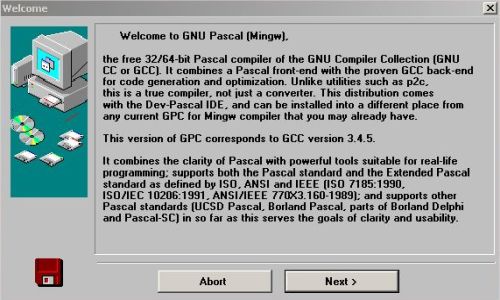
|
After the acceptance of the license, you get a short description of the GNU Pascal compiler included, then there are several windows, where you may or not select a component to be installed; I selected them all (including Chief's Installer Lite, the examples, templates and icons). Finally, an installation summary is displayed; push the Next button to continue.
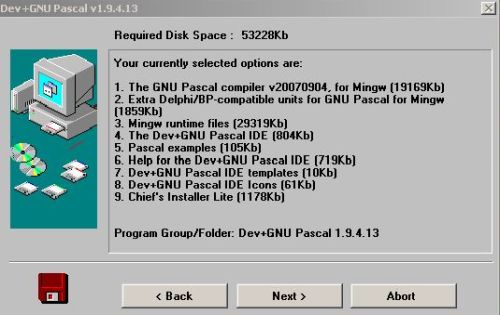
|
The installation folder (dev_gpc) is by default immediately beneath the root directory. I changed the install path to E:\Programs\dev_gpc (my Windows 2000 is actually part of a dual boot and installed on drive E:). When installation is finished, the Dev+GNU Pascal readme file is displayed (the file is a PDF document, thus you must have a PDF reader installed to be able to view it). You should carefully read the First use paragraph and follow the instructions given there (cf. further down in the text).
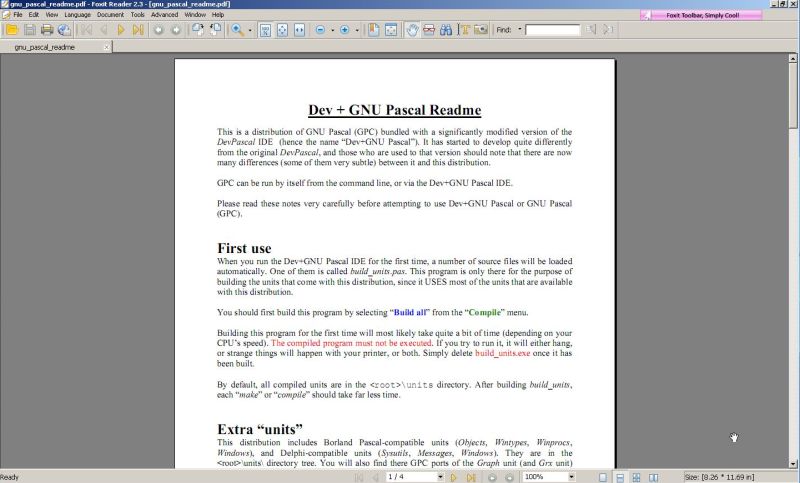
|
As described in readme.pdf, several files are loaded at the first startup of the IDE. From the menu, choose Window and select the source file build_units.pas.
![Dev+GNU Pascal on Windows 2000: Building the GPC units [1] Dev+GNU Pascal on Windows 2000: Building the GPC units [1]](../screenshots/devpas_gpc4.jpg)
|
The file build_units.pas is opened in the active editor window. From the menu, choose Compile > Build all.
![Dev+GNU Pascal on Windows 2000: Building the GPC units [2] Dev+GNU Pascal on Windows 2000: Building the GPC units [2]](../screenshots/devpas_gpc5.jpg)
|
The build should end with a dialog box similar to the one shown on the screenshot. The important point is that total errors = 0. The size of the executable build is also given as 0. That's because, as explained in the readme file, the build_units source is just intended to create object files of the included units (not to create whatever executable).
![Dev+GNU Pascal on Windows 2000: Building the GPC units [3] Dev+GNU Pascal on Windows 2000: Building the GPC units [3]](../screenshots/devpas_gpc6.jpg)
|
You can check the result of the build process (the files produced), by opening File Explorer and browse to the units subdirectory of your Dev+GNU Pascal installation folder (which in in my case is E:\Programs\dev_gpc\units), where you should find a whole bunch of object and other files.
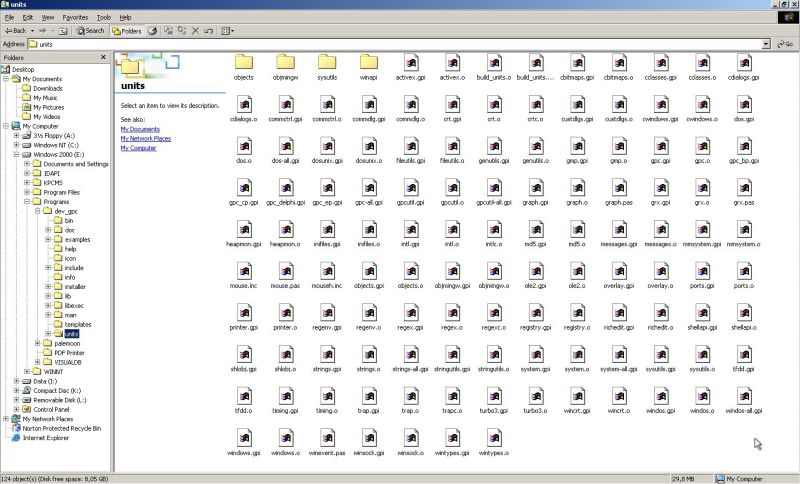
|
To build a program, just open the source file in the editor Window of the IDE, then choose Compile > Build all from the menu. You can run a program from within the IDE by choosing the menu command Compile > Run. One of the examples included with Dev+GNU Pascal is an analog clock (file GrClock.pas; in the examples subdirectory). I built it successfully as you can see on the screenshot below (execution by double-clicking the .exe file created by the build).
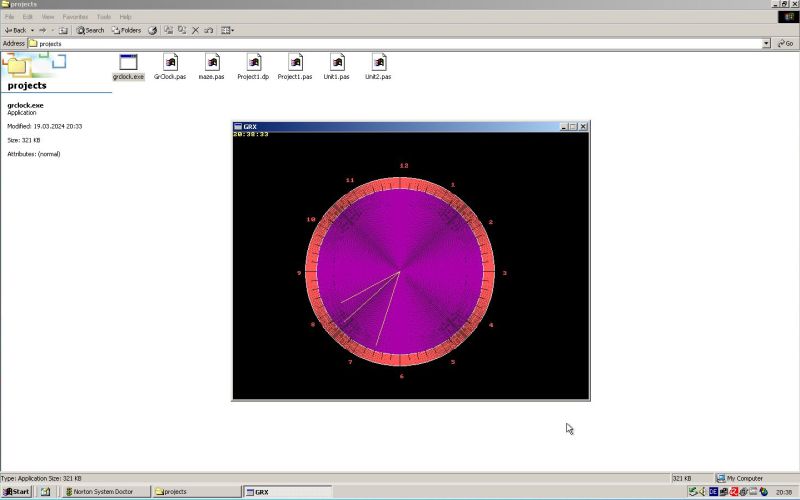
|
Trying to build my Free Pascal console programs, I succeeded with eququad (what shows that the Crt unit works correctly), but failed with blckjack and snake. The reason probably is that GNU Pascal and Free Pascal are not really compatible!
I also failed to build the example GUI application WinHello. No idea, what's the reason for this...
On the other hand, creating Windows GUI applications seems to work fine. To do so, choose File > New Project from the menu, and in the window that shows up, select Windows application
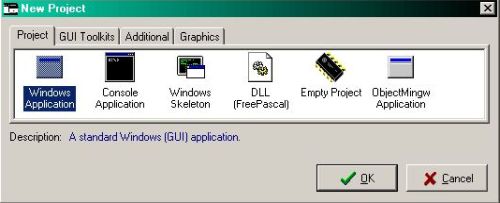
|
Save the project as Dev-Pascal project file (.dp) and the generated source template as Pascal source file (.pas); all other files will automatically created as needed. The template actually is a full functional application consisting of a form with a menu. This allows you to quickly set up your own form, by editing the source code provided. And you haven't to worry about the creation of the code to access the Win32 API and the one to actually run the application; all this is part of the template. If you need other components (edit fields, buttons, etc), have a look at the documentation, or example programs included.
I made some changes to the source template to create my own HelloPas.dp project. No problem with the build, no problem to run it (from within the IDE and from the file system). The screenshot below shows the .dp, .pas and .exe files in File Explorer and the execution of the application.
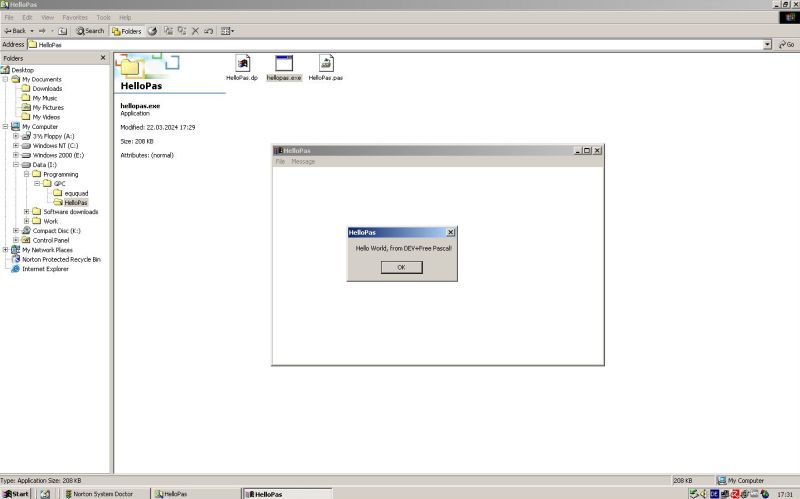
|
If you like this page, please, support me and this website by signing my guestbook.